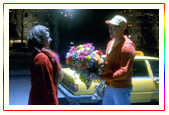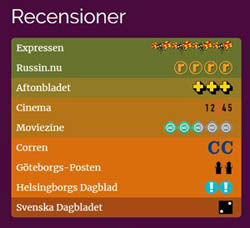|
Successful businessman Åke Jönsson
loves himself. And his career. And his big, expensive
car. But in a fateful moment his life is transformed,
and he loses his wife and his children, who, in the heat
of his career ambitions, he has forgotten to love.
Suddenly everything has changed, and Åke must go hunting
for love. But what happens when he finally learns to
love - and the one he loves is unattainable? |
|
"Staho's narrative is insensitive and
will deter most of the people relatively early in the
film. Many will find it incoherent and noisy and then
give up. But the style at the beginning is just a
lighter surrealistic presentation to a story about a
man's safe way to the abyss... The careful and rather
original use of colors, light cones and absurd contrasts
is the very distinctive feature of the film.

At the same
time, Staho is consistent in its quivering, anxiously
provoking storytelling...
Drama, humiliation, madness - it all goes out in ugly,
sexless surroundings, and this surface actually becomes
a depth because Staho just avoids all possible clichés
and instead concentrates on its raw material, namely the
actors and the strong visual instruments."
...Tobias Lynge Herler, philm.dk
"Ladies and gentlemen, Simon Staho
presents: Another movie with an unfortunate Mikael
Persbrandt behind the wheel of a car. He has honestly
gone completely apeshit with cheerful color filters and
costumes. Probably because it will give some kind of
intensity to history. Instead, it feels more like he
does not really dare to trust the script." ...Tomas
Hemstad. Nojesguiden
"Featuring an energetic central
performance by Mikael Persbrandt, the stylistically
brash picture is meandering and repetitive with
unnecessarily strident visuals, but its faults are
redeemed by its gentler, human moments. The outlandishly
exaggerated opening sequence has power-drunk middle-aged
businessman Ake (Persbrandt) ignoring the pleas of a man
he just fired (Nyqvist) to put him back on the payroll.
But what looks like a setup for a satire on modern
business quickly changes when Ake, who is trying to
drive and talk on his cell phone making a big money deal
at the same time, hits and kills his youngest son in his
driveway. Within the space of 20 minutes, Ake losses his
wife Nina and child Emma, the support of the rest of his
family, and his job. He starts work as a cab driver,
sleeping in his taxi outside his old house and picking
up and having sex with younger Linda. Much of the
remainder of the picture displays the humiliations to
which Linda, and the script, subject Ake. There is an
uneasy sense that the script is reveling in his
punishment a little too much." ...Jonathan
Holland, Variety
"Bang Bang Organgutang is a
film about love and sorrow. But to say that it is done
in an unconventional way is to undermine strongly...
Staho really uses the movie medium to the max. He mixes
with colors, image quality and sound in an interesting
and exciting way. In the most embroidered sequences, you
almost wonder if it's not Spike Jonze. Unfortunately,
Staho does not have a Charlie Kaufman script to work
from, but has written the story together with Peter
Asmussen. They are skilled at doing tragedy with simple
means, but do not have the same excitement as Kaufman.
In particular, the dialogue scenes become more than
legally theatrical and pretentious... It is easy to
admire the visual narrative style, but at the same time
it is difficult to get the right contact with the
characters... Summing up the review is about as
split as the movie itself. An interesting experiment
that is easy to applaud but hard to love."
...Kim Nilsson, Moviezine.se
 |